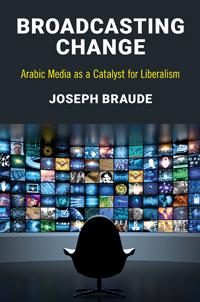The following is a new edition of Pax Arabica, Joseph Braude’s weekly newsletter. To subscribe, click here.
I’d like to share two items with you this week, each providing a glimpse into how proponents of social reform in Saudi Arabia have been striving to advance their goals.
– Last month at the Andrew W. Mellon auditorium in Washington, America Abroad Media honored Nasser Al-Qasabi, a leading Saudi comic actor whom I’m proud to call a friend. He climbed to stardom in Saudi Arabia with a bold weekly comedy show called Tash Matash (“You either get it or you don’t”), which spoofed the country’s religious police, male chauvinism, clerics’ domination of the educational sphere, and corruption in government. More recently, his pan-Arab hit show “Selfie” told the story of a middle aged man who ventures into ISIS-land to persuade his son to abandon jihadism and come home to Riyadh. Season 2 took on the Sunni-Shi’ite divide, through the story of two Saudi families, one from each sect, whose sons were mixed up at birth. Qasabi has braved death threats for his work — and moved the ball forward in the struggle for just causes in his native land. And he really is funny, as you’ll find by watching this video:
The video has been shared more than 11,000 times via social media to date. To tweet it, click here.
– Last week in the Hudson Institute journal Current Trends in Islamist Ideology, I published an interview with Abdulrahman Al-Rashed, former Al-Arabiya General Manager and Editor-in-Chief of Asharq Alawsat and Al-Majalla. Over a four-hour discussion, we explored the relationship between the Kingdom’s planned economic overhaul and the reform of Saudi religious and educational institutions. We discussed the potential role of nascent civil society organizations in fostering change, and what Americans and others might be able to do to strengthen their hand. Finally, we touched on what changes Saudi reformists hope to see in American policy toward Saudi Arabia under the Trump Administration, and how Saudi relations with Israel and Jews generally might be encouraged to improve. In response to the latter question, Al-Rashed said the following:
“Without a solution to the Israeli-Palestinian issue, prospects to do so are severely constrained. A resolution of that conflict, whether along the lines of the “Arab Peace Initiative” presented by the late King Abdullah or some other approach, will make it much easier to improve relations among Saudis, other Arabs, Jews generally, and Israelis. But if the question is specifically what can be done now — before the conflict is resolved — to increase connectivity, perhaps a new step would be for Saudi Arabia to formally lift its ban on work visas for Israel’s Arab citizens, and for Israel to welcome and foster Arab Israelis’ professional deployment to any Arab country. From a Saudi perspective, the case for doing so can be made openly in terms of the virtue of empowering all Palestinians, on either side of the Green Line. In seeking out the most qualified Arabs in Israel to work anywhere in the Gulf, moreover, we will inevitably find those who have achieved success in the mainstream of Israel’s economy and society — the tech sector, manufacturing, medicine, and so on. When they travel to the GCC states, their human networks and professional partnerships will effectively travel with them. Thus, they can serve as a human bridge, as Israel moves toward a political solution, gradually enabling partnerships between the broader populations of both sides.
“Normalization with Arab Israelis should be initiated by the Arab League in Cairo, which historically has been the lion’s den of resistance to normalization. To them we might say that, after all, many Jewish Israelis hold dual citizenship and are free to work almost anywhere in the region with their non-Israeli passport. Meanwhile, most Arab Israelis are banned from working in Arab countries because they hold only Israeli citizenship. In a similar vein, many Israeli companies are already exporting goods to Arab markets through foreign corporate entities, while Arab farmers in Israel cannot sell their tomatoes in the Gulf market.”

Abdulrahman Al-Rashed, interviewed by Joseph Braude in December 2016.
In Saudi Arabia, several newspaper editorials have debated Al-Rashed’s formulations, including the widely read youth magazine Elaph. Meanwhile, the “Israeli Arab” proposal has garnered attention in Israel’s Hebrew and English press, as well as Norway and elsewhere. For its part, the Israel Peace Initiative, an NGO devoted to building support for a regional solution to the conflict, responded warmly to Al-Rashed’s suggestion in an article in Yediot Aharonot.
To Tweet the interview, click here.

Speak Your Mind